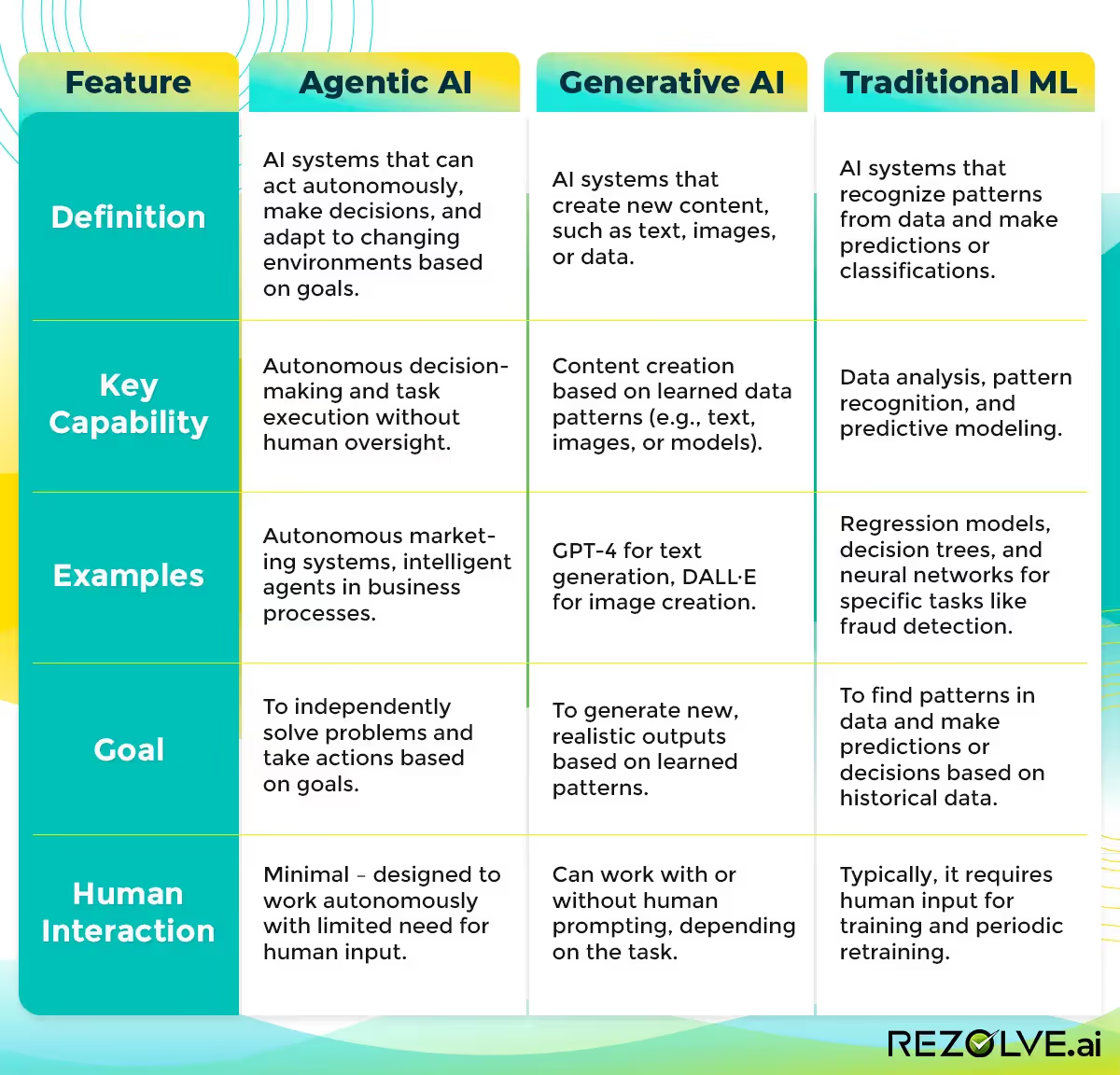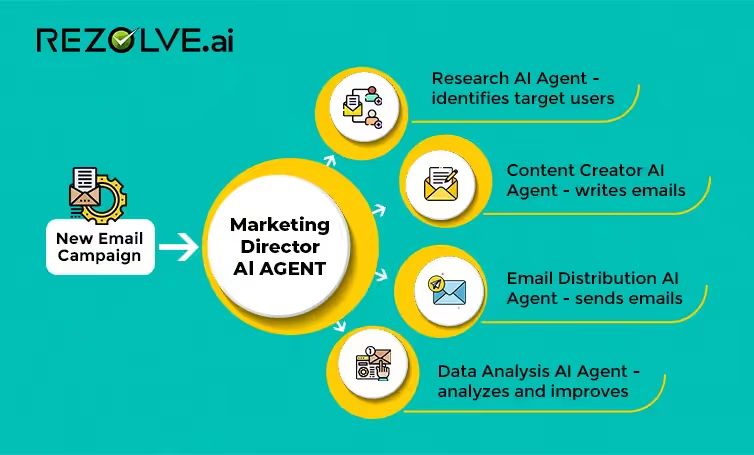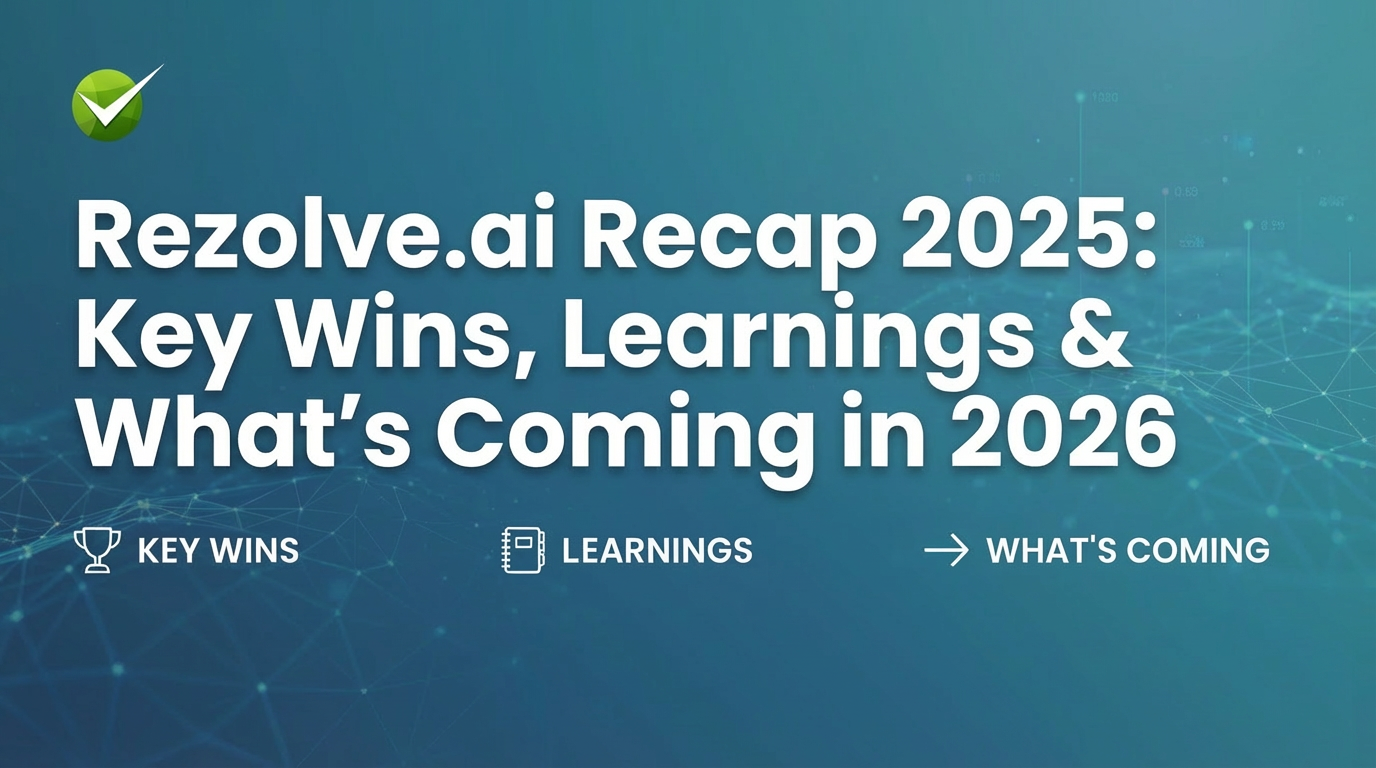Agentic AI refers to AI systems that can act independently, make decisions, and perform tasks without constant human control. Think of it like a digital assistant that doesn’t just follow instructions but also figures out the best way to solve a problem based on the goals it has been given.
Agentic AI is getting a lot of attention because of its promise and ability to deliver business outcomes, not just automate tasks. For example, if you are a marketer – in the past, you may use AI to help you draft an email or write a blog, but with agentic AI – you may simply be able to ask it to run an email campaign to generate leads. The task of understanding your products, identifying targets, researching targets, drafting personalized emails, sending a campaign, and analyzing results will all be done by a Marketing AI Agent (at some point, you may even decide to hand over the lead to your AI Sales Agent☺)
Curious about why everyone’s buzzing about Agentic AI? Tune in to our podcast episode for an engaging discussion on its potential, real-world applications, and why it’s shaping the future of AI.
Listen now and stay ahead of the curve!
So, the definition of an Agentic AI is:
“An AI system with the following four characteristics.
- Autonomous – it can do a full range of work without needing step-by-step guidance (though it can still be supervised by humans as needed)
- Outcome Oriented – it can take a goal, deconstruct it into specific sub-tasks and manage the work to deliver the result
- Continuously learning and adapting: It can analyze the outcomes of past activity and perceive context to improve itself
- Collaborating: It can partner with other AI systems or people to deliver the target outcome”
How Is Agentic AI Different from Other Common Types of AI?
Enterprises have long leveraged AI for data analysis and content generation, especially since ChatGPT emerged on the scene, but these approaches stop short of true autonomy.
Agentic AI distinguishes itself by orchestrating entire workflows—ingesting goals, planning actions, executing tasks, and learning from outcomes—without constant human intervention. Below, we compare Agentic AI against prevalent AI paradigms.
Traditional Machine Learning
Traditional ML excels at pattern recognition and prediction using historical data. Models are trained to classify, regress, or cluster, but they rely on human‑designed pipelines: data scientists must define each step, from feature engineering to model retraining. While powerful for analytics, traditional ML does not plan or execute business processes on its own.
Generative AI
Generative AI focuses on content creation—text, images, code—based on human prompts. It shines in creative and productivity scenarios (“Write a blog post,” “Generate a product design”) but stops at generating outputs. The user remains responsible for sequencing subsequent actions, making it unsuitable for end‑to‑end process automation.
Task‑Specific AI Agents
Task‑specific agents (e.g., FAQ chatbots, email‑drafting assistants) automate individual tasks through predefined scripts or lightweight learning. They can handle discrete functions autonomously but lack the capacity to plan multi‑step workflows, adapt dynamically across tasks, or integrate learning from one task into another.
Agentic AI
Agentic AI delivers full‑spectrum autonomy. It ingests high‑level goals, self‑plans by decomposing objectives into sub‑tasks, executes each step via specialized AI models and system integrations, and continuously learns to optimize future performance. This end‑to‑end orchestration unlocks continuous optimization, personalization at scale, and seamless collaboration across systems—capabilities that traditional ML, generative models, and task‑specific agents cannot provide.

Agentic AI Architecture & How It Works
At its core, Agentic AI is built on four interconnected layers that transform strategic goals into tangible outcomes. By combining these layers, an Agentic AI system self‑governs and improves over time.
Goal Ingesting
The goal ingesting layer of the agentic AI architecture interprets and validates high‑level objectives. It uses natural language understanding to parse intent, normalize constraints (e.g., compliance requirements), and translate goals into machine‑readable directives.
Planning
Once objectives are clear, the Planner decomposes them into an ordered sequence of sub‑tasks. For an application in the enterprise like employee support, this might include categorizing tickets, selecting resolution playbooks, scheduling remediation steps, and defining escalation criteria. The Planner allocates resources, estimates timelines, and prepares a roadmap for execution.
Execution
The Executor invokes the necessary AI models, APIs, and system integrations to carry out each sub‑task. If the agentic AI is tasked with offering employee support, the Executor might run conversational flows to gather missing ticket details, apply automated fixes for known issues, or call service desk APIs to update ticket status. This layer ensures reliable, accurate task execution.
Learning
After tasks are completed, the Learner analyzes performance against predefined KPIs—resolution time, escalation rate, user satisfaction—and feeds insights back into the Planner. It tunes decision thresholds, updates playbooks, and refines strategies, enabling the system to continuously optimize its operations.
Agentic AI in Action: A Conversational IT Support Example
Imagine Sarah, an employee in Microsoft Teams, typing:
“@ITSupportBot I can’t access the VPN—need it for today’s client call.”
Her company has incorporated an agentic AI system—think of solutions like Rezolve.ai—for conversational IT support right inside Teams. Within seconds, the AI parses her request, identifies an authentication error in the VPN logs, and springs into action without involving a human agent.
Behind the scenes, the agentic AI autonomously runs diagnostic checks on the VPN service, resets Sarah’s credentials if necessary, and updates her access rights in the directory. It then tests the connection end‑to‑end, confirming that she can log in successfully.
Moments later, Sarah receives a Teams notification:
“Your VPN credentials have been reset and access restored. Please try reconnecting now.”
Throughout this interaction, the system logs the incident, measures resolution time against KPIs, and refines its troubleshooting steps for similar tickets. All of this happens seamlessly—no queue, no hand‑offs—freeing IT staff to focus on strategic projects while the agentic AI continuously learns and optimizes every support interaction.
Agentic AI Benefits: How Agentic AI Can Transform the Top 10 Enterprise Functions
Agentic AI brings true autonomy to business processes by combining goal‑driven planning, execution, and continuous learning. Below are ten core enterprise functions—each transformed by Agentic AI.
Support Automation
Agentic AI agents autonomously handle high‑volume inquiries via chatbots or virtual assistants, boosting efficiency and ensuring 24/7 consistency.
IT Service Management (ITSM)
Specialized ITSM agents manage ticket triage, routine fixes, and intelligent escalations, slashing resolution times and lowering support costs.
Marketing Automation
By analyzing customer behavior and orchestrating multi‑channel campaigns, Agentic AI delivers hyper‑personalization at scale.
Sales Automation
Agentic AI streamlines lead scoring, outreach sequencing, and demo scheduling—amplifying productivity across the sales funnel.
Automated IT Operations (AIOps)
Continuous infrastructure monitoring and self‑healing incident management empower teams to improve reliability and uptime.
Human Resources (HR)
From resume screening to employee onboarding workflows, Agentic AI standardizes processes and enhances consistency in talent management.
Business Process Automation (BPM)
Complex workflows—such as multi‑step approvals and risk assessments—are executed end‑to‑end, accelerating decision‑making and reducing manual handoffs.
Procurement Automation
Agents generate purchase orders, reconcile invoices, and negotiate vendor terms, minimizing errors and speeding up procurement cycles.
Cybersecurity
Autonomous threat detection, real‑time vulnerability scanning, and countermeasure deployment strengthen security posture against ever‑evolving attacks.
Fraud Detection and Prevention
Real‑time transaction monitoring and anomaly detection enable agents to identify and block fraudulent activities, minimizing losses.
Across these functions, Agentic AI delivers end‑to‑end automation, continuous optimization, and personalization at scale, enabling enterprises to achieve outcomes that traditional ML or standalone generative AI cannot match.
Harnessing swarm Intelligence across multiple enterprise AI agents
We as employees coordinate across multiple functions in a company. Whether it's marketing working with sales to grow revenue or HR working with IT to onboard a new employee – we cannot imagine work being done without such collaboration. With the rise of Agentic AI, it is only natural to assume that these autonomous AI agents will collaborate to handle complex tasks. This may be applicable even within a single function like Marketing with sub-specialized AI Agents. Here is an example -

What roles will humans play alongside Agentic AI?
Humans have an integral role to play alongside their new AI Teammates. This includes
- Supervision and Verification: Periodic review and audit of the work by AI agents to ensure it complies with the company’s standards and policies.
- Approvals: For high-risk or high-value transactions, such as healthcare-related or money–movement transactions, the final approvals should be human to eliminate any risk.
- Escalations: Humans may be better suited to handle complex one-off issues or difficult situations, such as an irate customer.
- Performance Reviews: Humans should review the bot's KPIs to ensure they are meeting business needs and, when necessary, look for alternatives.
- Hiring: As Agentic Ai expands to new business functions, look for opportunities to expand and use the technology.
What Are Some Best Practices and Potential Challenges with Implementing Agentic AI?
To maximize your chances of success with Agentic AI, adopt a deliberate, phased approach. Begin in low‑risk areas to build confidence, rigorously quantify expected returns, choose platforms tailored to your domain, and measure outcomes with clear KPIs. This systematic methodology not only unlocks the core benefits of Agentic AI—personalization, scalability, and continuous optimization—but also creates a repeatable blueprint for broader roll‑out.
Pilot in Low‑Risk Functions
- Start with mature, well‑understood workflows—such as IT Service Management (ITSM) or customer support—where the upside of automation is clear and the operational risk is minimal.
- Why ITSM & Support? These areas have high volumes of repetitive tasks (e.g., Level 1 ticket triage, password resets) and mature integration points (ticketing systems, CRM).
- How to begin: Follow our Agentic AI Pilot guide to compare Co‑Pilot vs Agentic AI and identify an initial use case with measurable outcomes.
- Benefit in action: Automating routine tickets enables agents to focus on complex issues, delivering greater personalization to end‑users and instantly scaling support capacity under load.
Conduct a Rigorous ROI Assessment
- Quantifying value upfront anchors stakeholder buy‑in and ensures you invest in the right use cases.
- Historical Data Analysis: Review past performance metrics—ticket resolution times, support costs, campaign ROI—to establish a baseline.
- Quick Value Assessment (QVA): Use our QVA tool to model savings, productivity gains, and payback period.
- Outcome: A data‑driven business case accelerates executive approval, while highlighting where continuous optimization will yield the greatest returns.
Leverage Domain‑Specific Platforms
- Generic AI toolkits often require extensive customization. Domain‑specific solutions deliver faster time‑to‑value by packaging best practices, pre‑built connectors, and tuned models.
- Platform Selection: Explore our roundup of the Top Conversational AI Platforms to find the right fit for ITSM, marketing, HR or other functions.
- Why it matters: Pre‑trained domain models and turnkey integrations accelerate deployment, unleashing scalability without extensive engineering lift.
Define Clear, Measurable KPIs
- Without well‑scoped metrics, you can’t prove success or guide iterative improvements.
- Sample KPIs: Percentage of L1 tickets automated, average response time reduction, campaign conversion lift, NPS improvements.
- ITSM Example: Aim to automate ≥ 50% of L1 tickets—see how conversational ITSM can drive this in our L1 Ticket Automation overview.
- Continuous Monitoring: Regularly review these metrics to fuel the continuous optimization loop, enabling your Agentic AI to learn and adapt over time.
Potential Challenges
Even with the right strategy, Agentic AI adoption faces headwinds. Anticipate these hurdles early and put safeguards in place to maintain trust, compliance, and performance.
Data Privacy & Security
- Risk: Autonomous agents need access to sensitive systems and PII.
- Mitigation: Implement end‑to‑end encryption, strict role‑based access controls, and routine security audits. Ensure your Agentic AI platform complies with GDPR, HIPAA, or other relevant standards to protect data throughout ingestion, processing, and storage.
Model Drift & Continuous Maintenance
- Risk: Over time, agent performance can degrade as data and business context evolve.
- Mitigation: Establish a retraining cadence—feed agents fresh logs and feedback loops. Monitor key performance indicators for signs of drift, and automate retraining pipelines where possible to preserve accuracy and efficiency.
Change Management & User Trust
- Risk: Employees may fear job displacement or lack confidence in AI decisions.
- Mitigation:
- Transparent Communication: Share pilot results and metric dashboards openly.
- Training & Onboarding: Offer hands‑on workshops demonstrating how Agentic AI augments—not replaces—their roles.
- Governance Framework: Define clear human‑in‑the‑loop checkpoints for high‑risk decisions, building trust through oversight.
Interpretability & Auditability
- Risk: As agents take on more autonomy, it becomes harder to explain why they made specific decisions—a compliance red flag.
- Mitigation:
- Explainability Layers: Integrate model‑agnostic tools to surface reasoning behind key actions.
- Audit Trails: Log every decision, parameter change, and outcome in a centralized ledger for post‑hoc review and regulatory reporting.
Closing Note
Agentic AI represents a transformative leap from task‑level automation to fully autonomous, goal‑driven workflows. By combining continuous optimization, personalization at scale, and seamless end‑to‑end orchestration, organizations can unlock dramatic gains in efficiency, reliability, and user satisfaction. As you embark on your Agentic AI journey, a structured approach—starting with low‑risk pilots, rigorous ROI assessments, and clear KPIs—will ensure you capture maximum value while mitigating common challenges.
For a deep dive into practical strategies, best practices, and real‑world case studies, download our comprehensive whitepaper:
Download the Rezolve.ai Whitepaper: Mastering Agentic AI for Enterprise Impact
Unlock your roadmap to autonomous workflows today.
FAQs
What is the difference between Generative AI and Agentic AI?
- Generative AI creates new content (text, images, code) based on learned data patterns.
- Agentic AI goes beyond content generation by autonomously planning, executing, and optimizing entire workflows to achieve specified goals.
What is an example of an Agentic AI in action?
- Rezolve.ai Agentic Sidekick 3.0 that automatically triages Level 1 tickets, applies fixes or escalates issues, and learns from outcomes to reduce resolution times.
AI Agents vs Agentic AI: what’s the difference?
- AI Agents: Standalone autonomous components performing individual tasks.
- Agentic AI: Orchestrates multiple AI agents end‑to‑end, adding layers of planning, decision‑making, and continuous learning to deliver complete solutions.
What are the key benefits of Agentic AI?
- Efficiency: Automates full workflows without constant human oversight.
- Scalability: Learns from each run to improve performance and ROI.
- Adaptability: Adjusts strategies in real time based on contextual data.
- Personalization: Delivers tailored actions and outputs for maximum impact.
How do you get started with Agentic AI?
- Pilot a low‑risk function (e.g., ITSM or customer support) and set clear KPIs like % of automated L1 tickets.
- Leverage a domain‑specific platform such as Rezolve.ai to run an ROI assessment, deploy quickly, and scale as you validate outcomes.





.webp)




.jpg)

.png)








.png)